Page content
The Life and Literature of Nathaniel Beverley Tucker
by Robert Doares Jr.
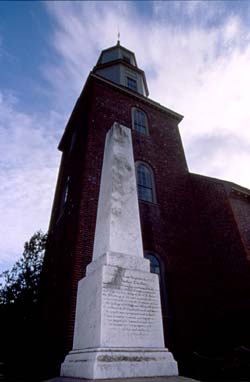
Tucker's tombstone dominates the Duke of Gloucester Street entry to Williamsburg’s Bruton Parish Graveyard. - Ellen Rudolph
Perhaps the most prominent marker in the graveyard at Williamsburg’s Bruton Parish Church, the tall obelisk on your left as you turn through the Duke of Gloucester Street gate, rises in memory of a famous man about whom most of us know nothing. Beneath it rests Judge Nathaniel Beverley Tucker, with his third wife, Lucy Ann Smith. Their marble, just this side of the bell tower, is today more prominent than Judge Tucker’s nearly forgotten notoriety as a Southern secessionist, author of distinction, mentor of Edgar Allan Poe, and writer of a novel depicting the outbreak of the Civil War twenty-five years before the event.
Tucker lived from 1784 until 1851, and his epitaph on the sunny side of the stone reads:
Descended from Virginia’s best blood
JUDGE TUCKER
Was by birth, and training, a gentleman of the old school
He filled with credit and distinction positions of trust
and dignity. Was Judge of the U.S. Court in
the Territory of Missouri, and after his return
to his native State was the Professor of Law
in the College of William and Mary till his death
His influence in developing the minds and characters
of his pupils was a prominent trait in his character
He was a ready, accurate, and elegant writer
He was hospitable, benevolent, and charitable
And his honor and integrity were without a stain
This eminent scholar and author; upright Judge
learned jurist, constant friend, affectionate husband
and Father died as he lived, a Sage, a Patriot
and a Christian.
The eulogy only hints at the humdinger of a biography that could be composed for the most distinguished resident of nineteenth-century Williamsburg.
His father, St. George Tucker, youngest son of a leading Bermudan family, came to Virginia in 1771 to attend the College of William and Mary, where he read law under George Wythe. He opened a practice in Southside Virginia’s Dinwiddie County in April 1774.
The next spring he was admitted to the bar of the colony’s more rewarding and prestigious General Court in Williamsburg. But days later Virginia’s rebellious General Assembly closed that tribunal to buttress the association against trade with England. It became, thus, impossible for English merchants to enforce claims against Virginia customers and clients, and for St. George Tucker to pursue a practice in the capital. He turned instead to the lucrative wartime shipping of commodities from his Bermuda birthplace to the mainland, and he prospered. Later a Virginia militia officer, he was wounded at Guilford Courthouse, North Carolina, and as an aide to Governor Thomas Nelson Jr., witnessed the defeat and surrender of Cornwallis at Yorktown in 1781.
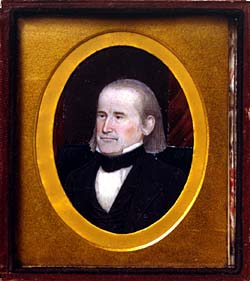
The likeness of Tucker captured in this
miniature was by his daughter thought
imperfect. Through the courtesy of his
great-granddaughter, it is here published
for the first time. - Courtesy Cynthia Barlowe
St. George Tucker married in 1778 the young widow Frances Bland Randolph. The newlyweds and the three small sons she brought to the marriage lived at the bride’s plantation, Matoax, in Chesterfield County-though during the war the family moved for its safety first to Winterpock, also in Chesterfield, and then to Bizarre on the Appomattox River in Cumberland. These peregrinations and his absences notwithstanding, the couple produced six more children, five of whom survived infancy. The youngest, Nathaniel Beverley, was born September 6, 1784, back home at Matoax. He was named after a poet, his paternal uncle Nathaniel Tucker, and his father’s wartime comrade Beverley Randolph.
Beverley, as the boy was called, was not yet four when his mother died and the grief-stricken family moved to Williamsburg, where he spent a difficult childhood. In 1791 St. George Tucker found the boy a loving stepmother in Lelia Skipwith Carter, but five of his nine brothers and sisters died before he was twelve. The lad was intelligent and imaginative, but rebelled at being put to the books. Nevertheless, as a teenager he turned himself around, largely under the influence of his studious older brother Henry, and by 1799, fifteen-year-old Beverley had enrolled at William and Mary.
Beverley Tucker’s views of politics and society began to form during these years. Town and college were ecstatic when Thomas Jefferson won the presidency in 1801. Williamsburg welcomed the victory of Jefferson’s Republican Party as an antidote to the increasing power of the federal government. Virginians talked warmly of individual liberty and states’ rights. Beverly Tucker was among them.
He also developed the enthusiast’s taste for religion, an appetite not satisfied by the somewhat staid Bruton Church services the college required students to attend. Late in life, he wrote:
The officiating minister of the place was a pious man, but he was a man of ungracious manners and consequently little liked. In his church, which I was made to attend regularly, to keep me out of mischief, I heard no discourse of an evangelical character. He preached after the manner of the established clergy of England, as to an audience already believing the Gospel, and understanding all its doctrines, and only needing to be instructed in those duties which a regard for consistency might require them to observe. His church consisted of a few formal fantastical old-fashioned prigs-who seemed to set themselves up as laughing stocks for the boys, by the apparent ostentation with which they read the responses. Upon the whole we had our fun out of them, and this was all we got by going to church. . . .
Outside the classroom, no one had more influence on Beverley Tucker’s early manhood than his elder half-brother, John Randolph—John Randolph of Roanoke, as he styled himself. By 1800, the twenty-seven-year-old Randolph had been elected to Congress. Though a brilliant orator and politician, Randolph was hypersensitive, controversial, and intermittently mentally ill. Tucker worshiped him and adopted most of the charismatic Randolph’s views, including his uncompromising championship of states’ rights.
Tucker’s undergraduate days ended precipitously in 1802 when the scholars rioted over the expulsion of two boys for dueling. Northern anti-Jeffersonian papers reported that students raided the church, tore up the Bible, and smeared the altar with cow dung. Press accounts may have exaggerated, but his father withdrew him from the college and sent him to Staunton, Virginia, to read law with the youngster’s former tutor, John Coalter.
By 1809, Tucker had begun the practice of law in Southside’s Charlotte Court House and had started a family. He was a captain in the militia during the War of 1812, but, to his chagrin, saw no fighting. Nor was there much action in his office; too little to make a living. It seemed to him there was too much competition from upstart lawyers from the lower classes, so, in 1816, Tucker took his family, slaves, and dreams to the Missouri Territory. He purchased a plantation, opened a St. Louis practice that succeeded, and served for more than a decade as a circuit court judge.
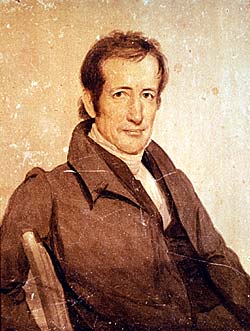
Judge Tucker's forthrightness shows through
the disrepair of this early nineteenth-century portrait. - Colonial Williamsburg
Tucker spent seventeen years in Missouri, where he gathered about him other transplanted Virginians in hopes of molding Missouri into the kind of planter-led society that he saw passing away in old Virginia. Though Tucker never served in elective office in Missouri, he was instrumental in drafting the state constitution and debating the Missouri Compromise of 1820. He agitated in the press and on the stump for the right of Missouri and other territories to enter the Union as slave states. Though Tucker achieved the kind of recognition that had eluded him in Virginia, he came to realize that the small farmers of Missouri would never accept his ideal of a society based on the rule of a slaveholding elite.
Tucker lost two wives and two children in Missouri. Traveling vast court circuits, he suffered exhaustion, debilitating illness, and depression. Throughout his tribulations he seems to have been sustained by vibrant religious conviction and wrote of his belief in a loving God who, for their benefit, exposes men to evil and suffering. He became an evangelical Presbyterian and wrote religious tracts and sermons for publication.
By 1830, Tucker had overcome a long period of despondency and taken a third wife, Lucy Ann Smith. A year later, at 47, he became a father again, with the birth of a daughter, Cynthia Beverley.
In the fall of 1832, a crisis back East compelled Tucker to consider moving his family back to Williamsburg. John C. Calhoun and a South Carolina convention had declared void two federal tariff laws. President Andrew Jackson responded by proclaiming the national government’s unequivocal prerogative to enforce its laws in all the states of the Union. He further decreed that no state possessed the right to secede from the United States.
To states’ rights men like Tucker, it was blasphemy. In a letter to his wife on New Year’s Day 1833, he wrote: “You have looked strange at me, when I told you what was going to take place. . . . I am now equally clear in the opinion that it will go on to the extreme of disunion, accompanied by a bloody struggle.”
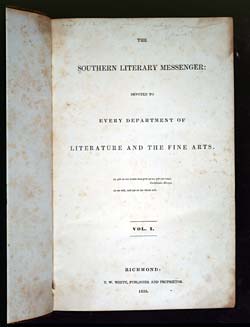
The first issue of the magazine on which Tucker and Edgar Allan Poe would collaborate. - Tom Green
For years, Tucker had recommended secession as the peaceful and legal way to redress the constitutional imbalances Southern states believed weighed against them in the federal arrangement. He said that if the South withdrew from the Union temporarily, Washington would be forced to negotiate more favorable terms for its reentry. Tucker had always supposed Virginia would lead the rest of the South out of the Union, but now he pinned his hopes on South Carolina. He was certain Jackson’s proclamations would precipitate immediate secession, and he rushed home to Virginia to be a part of it.
Back in Williamsburg, Tucker bought out his siblings’ interest in their childhood home, the St. George Tucker House on Nicholson Street, and installed his own family. In 1834, William and Mary elected him, at age 50, to fill its vacant law professorship, a position that had been his father’s after Wythe’s resignation in 1789. The law school had since grown all but defunct, but the younger Tucker’s reputation as a jurist and his personal charm brought bulging enrollment and new prestige to the college. For the last seventeen years of his life, Professor Tucker inculcated a generation of students with the sanctity of states’ rights and the reasonableness of disunion as a remedy against federal encroachments.
Beverley Tucker now also began a prolific and creative period of literary production. In Richmond, publisher Thomas White had just launched the Southern Literary Messenger, the South’s only magazine of letters. White approached the new law professor about regular contributions, and Tucker was delighted. Not only did he submit essays, poems, and book reviews during the next several years; for a time he was the periodical’s unofficial editor.
Through his work with the Messenger, Tucker embarked on a brief but significant association with its assistant editor, Edgar Allan Poe. Already recognized for his literary criticism, Poe was beginning his career in fiction. Tucker had met Poe’s poor deceased mother when she was but a girl, and he took a fatherly as well as a professional interest in her young son.
Though they never met face-to-face, correspondence between Poe and Tucker shows Poe admired Tucker’s literary abilities and sought his advice. Tucker was among the first to recognize Poe’s genius, and readily admitted it was greater than his own. Tucker did suggest, however, that Poe abandon his dabbling in horror tales, a genre Tucker considered beneath the dignity of a gentleman. To Thomas White, Tucker wrote of Poe: “He is made for better things than to cater to the depraved taste of the literary vulgar, the most disgusting and impertinent of all vulgarians. . . . Mr. Poe has taught me to expect from him something more than the physique of the horrible.”
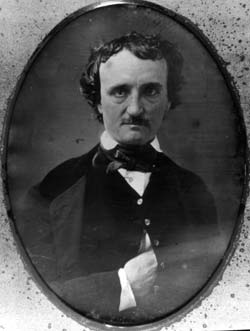
Tucker mentored Edgar Allan Poe as the Richmond writer began his literary career. -University of Virginia Library
Poe and Tucker published most of their work anonymously, then the custom of Southern writers. The Messenger ceased publication in 1864, but scholars are still trying to match all its contributors to their contributions, with a special interest in the Poe corpus. The similarity of Tucker’s and Poe’s styles has confounded literary sleuths, who have included Tucker articles in later collections of Poe. A letter from Poe to Tucker proves a case of misattribution. Poe’s letter compliments the judge’s review of a particular book-the same review that appears in a subsequent edition of Poe.
The tally of Beverley Tucker’s surviving works in periodicals, pamphlets, or books comes to more than ninety pieces. In his later years he published three novels, a testament to his mental agility. He wrote the first, George Balcombe, and the second, The Partisan Leader—a total of four volumes—in four months during the winter of 1835-36, while busy in his second year as a law professor. The novels appeared in 1836 without attribution by name.
George Balcombe, set in Virginia and Missouri, is the story of a young Virginian about to be cheated of his inheritance. Poe’s review in the Messenger, which can be found on the World Wide Web at www.hti.umich.edu/cgi/m/moajrnl/moajrnl-idx?notisid=ACF2679-1617SOUT-29, called it the best American novel to date, but it was never reprinted and faded into relative obscurity.
The Partisan Leader enjoyed seven printings, the last in the early 1970s, and it is today available on the Web at docsouth.unc.edu/imls/tucker/menu.html. First published under the pseudonym Edward Williams Sidney, the novel bore the subtitle A Tale of the Future and the fictitious publication date 1856. Tucker hoped his book would prevent Martin Van Buren’s election to the presidency, but it did not reach the press in time for the balloting. The novel’s villain is Van Buren-by name-who in the fiction has gotten himself elected to a fourth term and assumed dictatorial powers. The setting is Virginia, where the populace is engaged in guerilla warfare against occupying Federal forces, who are trying to prevent the Old Dominion from joining a league of already seceded Southern states.
The Partisan Leader caused little commotion and was a commercial failure. Neither of Tucker’s 1836 novels brought him a cent, but he still had, as he said, an eager pen and continued his contributions to the Messenger and other periodicals. A third novel, Gertrude, appeared in serial form in the Messenger but was never published as a book; it also can be read on the Web at www.hti.umich.edu/cgi/m/moa jrnl/moajrnl-idx?notisid=ACF2679-1624SOUT-169. It relates the story of a girl caught up in the corruptive influences of the nation’s capital.
Judge Tucker was much frustrated with political affairs during the last decade of his life. He saw opportunities for peaceful secession of the Southern states slip away. He would not acknowledge that he was out of step with most Southerners, few of whom thought withdrawal from the Union was desirable. Tucker’s last great hope for Southern revolution came with the convention of Southern states at Nashville, Tennessee, in 1850. He delivered an energized keynote address and pled emotionally for secession, but moderation prevailed.
By the time he died August 26, 1851, Tucker’s promotion of what at that time seemed to be the lost cause of secession had made him in some circles a laughingstock. Though largely discredited and forgotten in the decade afterward, his memory loomed large in the minds of many in 1861, as the South became the Confederacy and two nations hurtled headlong into the cataclysm that Tucker had foreseen.
Had he been alive at the outbreak of war, Tucker would have made some money on The Partisan Leader. In 1861, a New York publisher reprinted it in hardback and paperback, this time with Tucker’s name. These editions contained a new preface purporting to identify the novel as conclusive proof of a thirty-year treasonable Southern disunion conspiracy. Not to be outdone, his daughter, now Cynthia Beverley Tucker Washington, arranged to have the book reprinted in Richmond in 1862. In the midst of war, and with hindsight, Southerners now regarded the novel’s unheeded admonitions as visionary.
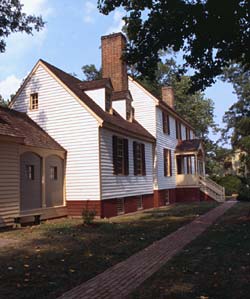
Colonial Williamsburg preserves the Tucker House on Nicholson Street for donor hospitality. - J. Hunter Barbour
Bob Doares’s story “The Man Who Would Not Be Governor” appeared in the winter 2000/2001 issue of the journal. Doares is an instructor in Colonial Williamsburg’s department of staff development.
Though he had predicted hardship and devastation, Judge Tucker never thought that the South would emerge from the conflict less than victorious and sovereign. Nathaniel Beverley Tucker rests in Bruton churchyard, tranquilly untroubled by the reality of so much wasted blood.
In 1884, daughter Cynthia, by then the remarried widow Cynthia Beverley Tucker Washington Coleman, organized a group of girls to preserve and restore the ancient gravestones at old Bruton. It was called the Catherine Memorial Society in memory of her twelve-year-old daughter-Judge Tucker’s granddaughter-who had died the year before and was buried in the churchyard. The society was the first recorded organization in the Williamsburg restoration movement, in some sense the seed of Colonial Williamsburg. And many days Cynthia and her girls worked in the shadow of the great marble obelisk that marked the final resting place of Judge Nathaniel Beverley Tucker.
In 1836, soon after Nathaniel Beverley Tucker returned from Missouri to live out his days in Williamsburg, he published a hundred-line poem in the Southern Literary Messenger. It is addressed to a young lady of Williamsburg who hopes to make an extended trip to Europe. Tucker tells her of how she will think longingly on the village, as he once did, when she is far away. Here is the conclusion of Tucker’s ode on Williamsburg:
Then mayst thou think how I, my wanderings o’er,
Have found my way back to my native bowers,
Among the few whom Time and Fate have left
Of early friends, to render up my breath,
And lay my bones beneath the turf, where once
My musing childhood strayed. And thou wilt think,
That fortune yet may have in store for thee,
Like destiny. For who so well may claim
To rest beneath the shade, to pluck the rose,
Or, on the mossy bank reclined, inhale
The violet’s balmy breath? And trust me, Lady,
Should clouds o’ercast the sunny sky that shines
So bright above thee; should a stormy fate,
Whelming thy hopes, cast thee a shipwrecked wanderer,
Wounded and bleeding, on thy native shore,
These are the scenes in which thy heart will seek
And find its consolation. Where besides
Is Sympathy so tender-Love so kind-
Religion so sincere? Where else has Hope
So learned to look, with cheerful confidence,
On worlds beyond the grave? Where else does Faith
So show its Love to God by Love to Man?
B.T.
The poem in its entirety is on the Web at www.hti.umich.edu/cgi/m/moajrnl/moajrnl-idx?notisid=ACF2679-1616SOUT-36
